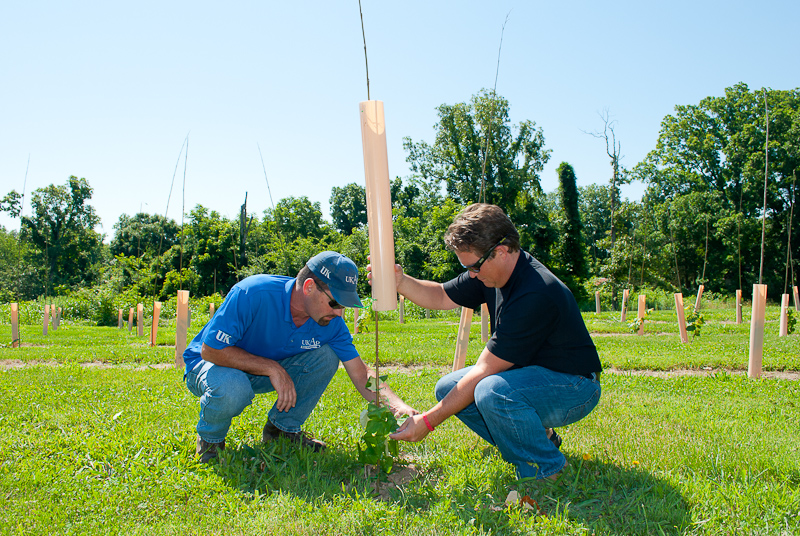Extension strengthens local economies by supporting entrepreneurs
Extension strengthens local economies by supporting entrepreneurs

Like many Kentuckians, Greg Drake has seen downtown businesses come and go in his hometown of Morgantown, leaving many buildings vacant, sometimes for years.
He’s also seen his county lose manufacturing jobs, as companies moved their operations overseas.
“In one month, we lost 40 percent of our industrial jobs,” said Drake, Butler County’s agriculture and natural resources extension agent.
Thanks to the information he and two Butler County business owners received as fellows of Class IV of the Kentucky Entrepreneurial Coaches Institute, they now hope to fill those vacant downtown buildings with small businesses.
The institute’s entrepreneurial leadership development program is a 16-month program founded by Ron Hustedde, extension professor in the University of Kentucky College of Agriculture. It teaches participants coaching and leadership techniques they can use to support entrepreneurs in their communities. Class IV fellows were from south-central Kentucky.
“We know that 50 percent of all jobs in the state of Kentucky are created by small firms,” Hustedde said. “We also know that 18 percent of adults in rural Kentucky have businesses, and that will expand to 25 percent in 2015 if current trends continue. It already exceeds that percentage in some counties.”
As a result of the institute, Drake and Kathern Jennings and Dwayne McKinney developed a virtual business incubator for those wanting to start businesses in Morgantown. Those interested in participating in the incubator go through eight coaching sessions with one of the trio and make a presentation to the group.
“We don’t tell them what to do. We just try to keep them focused and think things out,” McKinney said. “Even if it doesn’t work out and they decide not to open a business, it’s still a success because it may have kept somebody from losing everything they’ve got.”
Entrepreneurs who complete the program are eligible for several cost-share programs funded by the city and county governments, including getting half their rent paid for the first year they’re in business, if they locate in an existing building.
“We are trying to get businesses to open up and fill vacant buildingsin town,” Drake said. “Hopefully, this will help create more foot traffic to existing businesses.”
It was an opportunity that Jean Beattie and her husband James couldn’t let pass.
“We actually found out about the program when we went to city hall to ask about permits,” Jean Beattie said. “We were looking at buying a piece of land and building.”
The Beatties are the first entrepreneurs to complete the program. They recently hosted a grand opening of their businesses, a Charlie Biggs’ chicken franchise, Jeanne’s Sweet Treats and Jimbo’s Smokehouse, in a building that once was a gas station and grocery store. The businesses employ 26 part-time employees.
Jean Beattie said McKinney asked a lot of questions that many people starting a new business may not think about. She and her husband had previous experience in owning a business and had been talking about the current venture for two years, so they were able to answer a lot of his questions.
“Anyone who wants to open a business needs to go through the coaching program,” Jean Beattie said. “It gave us the confidence to know that we were going in the right direction.”
Like Drake, McKinney and Jennings, Nick Noble, owner of Park Mammoth Resort in Edmonson County, was a fellow of the Kentucky Entrepreneurial Coaches Institute Class IV.
Noble has tutored several individuals since graduating from the institute, but when he was thinking about installing a winery and vineyard at the resort, he sought advice from David Embrey, the county’s agriculture and natural resources extension agent; John Strang, UK extension professor of fruit and vegetable crops; Tom Cottrell, UK extension specialist for enology and Patsy Wilson, UK viticulture extension specialist.
“We knew we had plenty of land to grow grapes, but we had to decide on the exact location, do a soil test and determine the grape varieties that could be grown here. The UK Extension office was critical in that process,” Noble said.
When Noble came to him, Embrey had just completed a five-day entrepreneurial coaching class with the coaches institute.
“I helped him realize what he was getting into and how long it would take before the vines produced grapes,” he said.
Noble planted his vineyard this spring and plans to start hosting weddings and events next summer. The winery is already open, serving wines from five other Kentucky wineries.
He said the winery is helping him keep three people on his staff that he would normally have laid off when attendance at the resort’s golf course declined in the winter. He also plans to hire at least two more.
Community & Leadership Development Extension Horticulture

